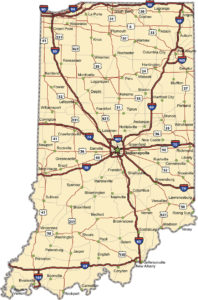What You Need to Know about New York's Online Sales Tax

Overall, the topic of collecting online sales tax is not as cut and dry as some would first assume, with ambiguous meanings and regulations, often confusing business owners. And hopefully, that’s where we come in to help!
In our series we have talked about multiple states, including Nevada, Washington and Colorado, and how each one handles the issue surrounding online sales tax for their state; up next in the lineup is New York.
A Summary of New York’s Online Sales Tax Law
New York was the first state in the country to enact a law for larger internet retailers (back in 2008). This law is referred to as the “Amazon Law,” based on the large internet retailer that used to have physical presence in very few states and therefore wasn’t required to collect sales tax. Amazon has now changed its business model and has worked with many states to collect sales tax. However, over the past several years, many states enacted “Amazon Laws” or “click through” statutes to get ahead of the company and internet retailers. New York was simply the first!Read more
FOCUS ON MISSISSIPPI

This month we travel to the land of Dixie, the southern state of Mississippi. The state is heavily forested with over half of the state’s area covered by wild trees including mostly pine, as well as cottonwood, elm, hickory, oak, pecan, sweetgum and tupelo.
The Mississippi River delta region is considered home of the blues music, where this type of music is honored at the Delta Blues Museum in Clarksdale. This region is also one of the top casino destinations between Las Vegas and Atlantic City. Many well-known and diverse singers came out of Mississippi including Elvis Presley, alternative rock band 3-Doors Down, Jimmy Buffet and Opera Singer Leontyne Price.
An Interesting Look at Nevada and Online Sales Tax

If you’ve been following along with our series about various states’ approach to online sales tax, you can see how multi-state tax issues can get confusing for business owners quickly.
At this point we’ve taken a look at the how Colorado, Alabama, Washington, Texas and Arizona establish nexus, which determines eligibility for state sales tax; today we review Nevada.
A Summary of Nevada’s Online Sales Tax Legislation
Nevada is one of the states that enacted the “Amazon Law” back in 2015. As Nolo.com explains, this means that a couple of years ago the state extended nexus to include:
- Retailers that have an agreement with a business or seller located in Nevada to pay for customer referrals obtained via a link on the Nevada seller’s website (a click-through arrangement)
- The out-of-state retailer’s gross receipts from these directed sales to Nevada customers exceeds $10,000 during the preceding four calendar quarters
ANOTHER MOVE TOWARD ECONOMIC NEXUS

Generally companies establish nexus by having a physical presence in the state. However, several states are pushing the boundaries of defining the physical presence in order to generate more revenue. Welcome to the concept of “economic nexus.”
Nexus and Physical Presence
As we discuss in a previous post, “nexus” is the term used to describe the minimum connection that a company (taxpayer) must have with the state in order for the state to be able to subject the company to its state taxing schemes (including sales tax, income tax, gross receipts tax and others). Nexus is normally established by companies having a physical presence in the state, by virtue of having employees, or third party contractors acting on their behalf in a state, or the presence of a warehouse or storefront in the state. Inventory in a state can also create nexus.Read more
The Inside Scoop: Arizona's Approach to Online Sales Tax

Have you been following our series on how states are approaching the online sales tax debate? So far we’ve taken a look at Colorado, Alabama, Washington and Texas; today we look at Arizona! Keep reading to see how the Grand Canyon State is approaching the issue.
A Summary of Arizona’s Online Sales Tax Legislation
Unlike the other states we’ve covered so far, Arizona interprets the 1992 court case, Quill Corp. v. North Dakota, a little bit more directly. The precedent set forth established that companies need to have a physical presence in the state (or nexus) in order for the state to collect sales tax on a purchase.
While many states establish economic nexus through a variety of provisions, Arizona’s 2015 Tax Handbook clearly states that physical presence as defined by Quill is key. And, as Nolo.com points out, “According to the same section, a company with no physical presence in the state, but whose products are both available in independently-owned Arizona stores and directly from the company via the internet, is not responsible for collecting sales tax.”Read more
Online Sales Tax in Texas: What Do You Need to Know?

Have you been following the online sales tax debate? Congress hasn’t been able to come up with a solution at this point, so states are taking matters into their own hands. This series showcases how various legislatures across the country are approaching the issue. So far we’ve covered Colorado, Alabama and Washington. This week we take a look at Texas.
A Summary of Texas’ Online Sales Tax Legislation
Although the 1992 court case, Quill Corp. v. North Dakota, set precedent that companies need to collect sales tax from customers in states where the business has a physical presence (or nexus), many states - including Texas - interpret that to mean that they can collect sales tax if your enterprise has established nexus in their state by other than just physical presence. This is often referred to as economic nexus.Read more
FOCUS ON NEW MEXICO

Welcome to the Land of Enchantment! This month we travel to the southwestern state of New Mexico. The states of New Mexico, Colorado, Arizona and Utah come together at the Four Corners in the northwestern corner of the state, the only such occurrence in the U.S. Although a large state, New Mexico has very little water, with a surface area of only about 250 square miles.
Inhabited by Native Americans for thousands of years before European Exploration, New Mexico was colonized in 1598 by the Imperial Spanish viceroyalty of New Spain. Later, it was part of independent Mexico before becoming a U.S. territory and eventually a U.S. state, as a result of the Mexican-American War. Among the U.S. states, New Mexico has the highest percentage of Hispanics, including descendants of the original Spanish colonists who have lived in the area for more than 400 years beginning in 1598. The demography and culture are shaped by these strong Hispanic and Native American Influences and is also expressed in the state flag. Its scarlet and gold colors are taken from the royal standards of Spain, along with the ancient symbol of the Zia, a Pueblo-related tribe.
What Do You Need To Know About Washington's Online Sales Tax?

The online sales tax debate continues, with states taking matters into their own hands instead of waiting for Congress to decide how to settle the matter. However, not all states are approaching the issue the same way. We’ve already looked at current and potential legislation in Colorado and Alabama; next we venture to Washington state!
A Summary of Washington’s Online Sales Tax Legislation
As we've previously explained, Washington prompted online sales tax collection by expanding its definition of nexus. Back in 2015, they rolled out the five-point internet sales tax solution, followed by establishing nexus through click-through retail solutions.Read more
MORE ART, LESS SCIENCE: MANAGING A TAX DISPUTE

At Miles Consulting Group, we often assist clients in audits, or other disputes with state agencies, such as departments of revenue, usually related to sales or income tax. In this month’s guest blog, Harry-Todd Astrov looks at disputes from the federal standpoint and things to consider before engaging in fancy tax planning.
On March 23, 2017, the IRS Large Business and International (LB&I) division announced the initial identification and selection of 13 “campaigns” to combat perceived tax compliance issues, with more campaigns to be identified and launched in coming months.
Several of these campaigns either explicitly or implicitly will target mid-market businesses. These include a campaign to examine transactions with non-U.S. related parties, a separate campaign to specifically examine the transfer pricing used by inbound distributors, whether S corporation are claiming losses in excess of basis, the repatriation structure being used for tax-free repatriation of funds into the U.S., and whether foreign companies doing business in the U.S. are filing a Form 1120-F with the IRS.
An Interesting Look: Alabama's Latest Online Sales Tax News

A couple of weeks ago we started a series that looks at the ramifications of various online sales tax legislation states across the country are proposing and signing into law. We started with Colorado as they’ve been at the forefront of the debate since 2010. Today we take a look at Alabama!
Alabama has been making waves in the state tax world because it passed legislation in 2015 that requires an out-of-state seller making retail sales within the state to register, and collect and remit sales tax on these sales by virtue of “economic nexus” if the seller has sales of more than $250,000 within Alabama, and engages in certain limited activities in the state. However, it does not require substantial physical presence as required in the 1992 Supreme Court decision (Quill). With the passage of these laws, Alabama drafted legislation that is unconstitutional and effectively challenging taxpayers to take the issue to court (or is challenging the federal government to finally enact some of the bills which have been circulating in Congress but have not passed). Whether that’s “simplified” or not is a question, but read on for a summary of the latest activities in the state.Read more



















